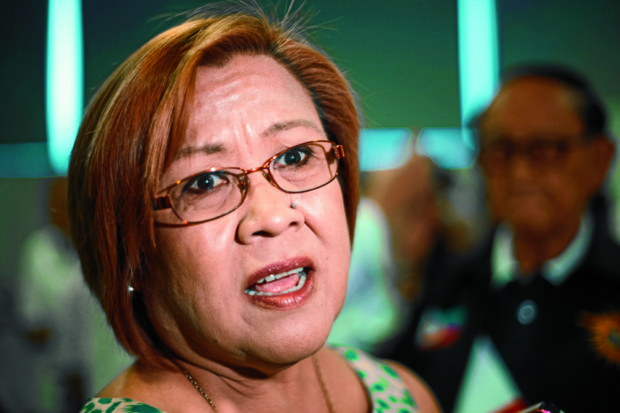De Lima asks Senate to probe drug slays
Warning that the string of killings may escalate into a state-sponsored “crime against humanity,” Sen. Leila de Lima is pushing ahead with her proposed legislative inquiry into the administration’s bloody war against drugs and crime despite the reluctance of some senators.
De Lima, who is expected to head the Senate committee on justice and human rights, on Thursday filed Senate Resolution No. 9 calling for an “urgent” investigation into the “rampant extrajudicial killings and summary executions of suspected criminals” in aid of bolstering police accountability for excesses and to “institute corrective legislative measures to ensure full respect for basic human rights.”
“The use of force, it appears in a lot of cases, fails to comply with the legal criteria of absolute necessity and proportionality,” De Lima, a former justice secretary and human rights chief, said in her resolution.
“Regardless of the question of whether those killed were in fact criminals, precisely because there was no opportunity for them to be prosecuted before a court of law, the fight against crime is apparently becoming a looming state-sanctioned cover for a policy of summary executions and extrajudicial killings of any and all suspected criminals” she said.
“An extrajudicial or summary killing is homicide. Carried out premeditatedly and in conspiracy with other public authorities, it becomes mass murder, which, if left unabated and unchecked, can escalate into a crime against humanity under international law,” De Lima warned.
Article continues after this advertisementBody count
Article continues after this advertisementIn her three-page resolution, De Lima cited how the body count had reached more than 300 since the election of President Duterte, known for his uncompromising stance on the illegal drug trade.
She found incredulous what had become a common police explanation that suspects slain while in police custody “ tried to wrest the arresting officer’s gun.”
Sen. Francis Pangilinan on Thursday urged the President to convene the Joint Judiciary-Executive-Legislative Advisory and Consultative Council (JJELACC) to arrest what he said was an indication of “a breakdown in law and order.”
“We have done it before. We can again work together to strengthen the administration of justice and speed up the disposition of cases. JJELACC can again serve as the strategic response to criminality and disregard for the rule of law,” Pangilinan said.
He proposed the convening of the body in 2007 and this was convened twice.
Sen. Panfilo Lacson, along with several other senators, has said the proposed inquiry was baseless and premature. Administration officials have also threatened to investigate De Lima, saying that on her watch as justice secretary the illegal drug trade flourished, pointing to convicted drug lords at New Bilibid Prison continuing their activities.
Presidential Communications Secretary Martin Andanar said the Philippine National Police was looking into “vigilante killings” and operations where deaths were involved.
“The government is against any form of extrajudicial killings. We do not condone these acts. Government is here to save our people from the drug menace and punish the offenders, including the big-time ones,” Andanar said in a statement.
“While the campaign against drugs is far from perfect, a generation of Filipinos have been saved from this scourge of society and destroyer of lives. Many communities are now relatively drug-free with record-high number of people giving up to authorities, choosing quieter and healthier lives,” he said.
Malacañang put the number of drug dependents who have surrendered at 60,000. With reports from Christine O. Avendaño and Leila B. Salaverria
